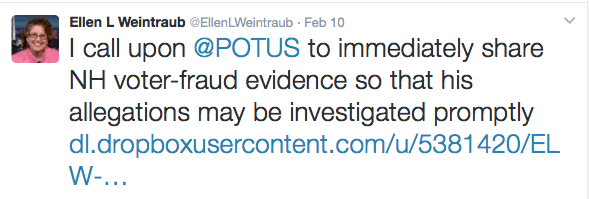
Naile: Evidence…if you want it
Having read your open letter to President Trump regarding voter fraud in the State of New Hampshire, where I happen to be a legal, domiciled resident, as well as a qualified voter, I offer some simple clarification about NH and voter fraud.
First of all, thank you very much for the opportunity to expose your blatant attempt at diversion. I could not have asked for a more opportune time for you to step out in front of an issue you have ignored for so long.
As you well know, the first statute you pointed to, RSA 659:34 (I) (e) Wrongful Voting; Penalties for Voter Fraud.
- A person is subject to a civil penalty not to exceed $5,000 if such person:
(e) Votes for any office or measure at an election if such person is not qualified to vote as provided in RSA 654;
You also point out another part of that statute:
- A person is guilty of a class B felony if, at any election, such person purposely or knowingly commits an act specified in subparagraph I(b) or I(e). A person is guilty of a class A misdemeanor if, at any election, such person purposely or knowingly commits any of the other acts listed in paragraph I, and, if the act involved the use of false proof of identity or voting using the name of another person, the person shall be sentenced to a mandatory sentence in the county correctional facility of not less than 30 days for a first offense under this section, 90 days for a second offense under this section, and 180 days for a third or subsequent offense under this section.
Let’s start with this. NH does not prosecute the type of voter fraud you mention. Unlike any other state I know of, we allow non-residents to vote here without abandoning their previous domicile, residence, abode, legal place of dwelling – call it what you will. NH calls them voters with a “mobile domicile.” See: Hannah Rivers v. NH. This case says college students can keep their home state driver’s license and use NH only for voting purposes, as long as in their minds, they are domiciled here. According to this Superior Court case, there is no proof a previous domicile was abandoned to claim a right to vote here, although our NH State Constitution was amended in 1974 to make a domicile a specific requirement for any inhabitant to vote..
You know this.
In a more recent case, Annmarie Guare v. NH, the NH State Supreme Court added insult to injury by determining:
“Upon becoming a “resident” of New Hampshire, one has 60 days in which to register one’s vehicle here and to obtain a New Hampshire driver’s license. See RSA 261:45 (2014); RSA 263:35 (2014). These requirements do not apply to citizens who are not “residents” of New Hampshire although they have their “domicile” here. The basic difference between a “resident” and a person who merely has a New Hampshire “domicile,” is that a “resident” has manifested an intent to remain in New Hampshire for the indefinite future, while a person who merely has a New Hampshire “domicile” has not manifested that same intent.”
It appears to me, and to anyone with a dictionary, that the NH Court has flipped the definition of domicile and resident for some odd reason.
Am I wrong?
It is irrelevant, in any case, what any NH court thinks about the difference between domicile, abode, habitation or residence. When you vote in a Federal Election, the subject here, you shall give your legal address to any election official in the state in which you intend to vote. You can only have one legal address to vote in a Federal Election – call it what you will.
You know that.
If you don’t think it is illegal to give false information to an election official in a Federal Election try your own US Code 52 – 10307 – Prohibited Acts
(c)False information in registering or voting; penalties
Whoever knowingly or willfully gives false information as to his name, address or period of residence in the voting district for the purpose of establishing his eligibility to register or vote, or conspires with another individual for the purpose of encouraging his false registration to vote or illegal voting, or pays or offers to pay or accepts payment either for registration to vote or for voting shall be fined not more than $10,000 or imprisoned not more than five years, or both: Provided, however, That this provision shall be applicable only to general, special, or primary elections held solely or in part for the purpose of selecting or electing any candidate for the office of President, Vice President, presidential elector, Member of the United States Senate, Member of the United States House of Representatives, Delegate from the District of Columbia, Guam, or the Virgin Islands, or Resident Commissioner of the Commonwealth of Puerto Rico.
But you know this.
In the New Hampshire elections regarding the United States Senate, this state allows, and I will use the best term I know you are familiar with, “unqualified” non-resident voters to cast ballots – thousands of them. Our statewide database of voters is choked with ghost voters who have voted and moved on.
This unlawful action by our state creates two classes of voter. One class of voter is a legal voter domiciled in NH as our State Constitution demands. The other voter can declare two domiciles at once, picking and choosing candidates, where they will hold a driver’s license, where, or if, they will serve on a jury, file taxes, or any other activity of a legal resident.
The sooner a qualified person from your office or the new US Attorney’s Office can arrive here and make NH follow Federal Election Law the better.
Regards
Ed Naile
Deering, NH




